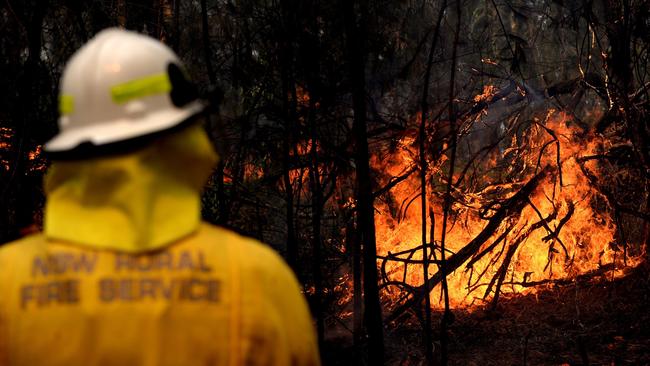Bushfires royal commission: Telcos told to up their game
The chair of the bushfire royal commission has questioned whether telcos have done enough to ensure that phones can be used during an emergency.

The chair of the bushfire royal commission has questioned whether telecommunications companies have done enough to ensure communities can use their phones during an emergency after thousands of Australians were cut off from mobile coverage during the Black Summer.
Mark Binskin on Thursday grilled Telstra, Optus, Vodafone and the NBN at the Royal Commission into Natural Disaster Arrangement, suggesting they had perhaps underestimated the important role they played during a bushfire event.
“There are some that still rely on radio but you are predominantly the major source of information for the community in a system that is now being designed where the community is fed information to be able to make decisions for themselves on when to go, and that’s the way the warning system works,” Mr Binskin said. “I will be honest with you, I’m not sure as a group you’ve looked at it in that way.”
He conceded there had been challenges in maintaining mobile coverage, given the unprecedented fire conditions, but pointed to inquiry submissions that suggested previous efforts to improve collaboration within the communication sector had “basically been useless”.
The commission has heard some affected communities had no mobile coverage and no warning before the inferno hit.
Pressed whether they had considered forewarning those in active bushfire zones of possible mobile outages, general manager of customer engineering at Optus Robert Pesavento said the telco communicated with customers only in the event of an outage and when the service had been restored.
“We are improving a planned outage notification,” he said.
“In an outage, we kept communication with our customers mostly through our website to give them an idea of when the service is going to come back up.
“We do not warn a community of the risk of an outage.”
Mr Pesavento said Optus had since reflected on this arrangement and believed all emergency messages, including potential outage warnings, should be streamlined and come from the RFS so communities weren’t bombarded with messages from essential service providers.
“Instead of a number of different warnings going out to the community,” he said, “we believe it would be better if it was one common communication.”
Mr Binskin said he hoped any updates to emergency messaging wouldn’t be a “five-year program” – a reference to evidence on Wednesday that a simplification of the national warnings system wasn’t expected to be rolled out until 2022.
Vodafone Hutchison Australia’s general manager of technology James Pickens said like Optus, their messaging was “reactive rather than proactive.”
About 1400 telecommunications facilities were impacted at the peak of the bushfire season in December and January, largely because of power outages.
Jill Cainey from Energy Networks Australia, the industry body representing Australia’s electricity transmission and distribution and gas distribution networks, gave evidence that the bushfires had impacted negatively on the ability of energy providers to secure insurance.
The body’s submission said at least eight specialist insurers had pulled out of or drastically reduced their capacity on bushfire risk within the past 12 months.




To join the conversation, please log in. Don't have an account? Register
Join the conversation, you are commenting as Logout